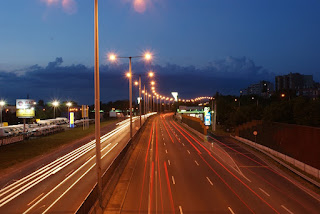In the grand theatre of transportation, from highways and
railways to aircraft and ships, lighting plays a pivotal role. It not only
illuminates the path—it enhances safety, meets regulations, boosts efficiency,
and even influences aesthetics. The transportation
lighting market is evolving at a rapid pace, fueled by technological
advances, stringent safety standards, and demand for energy-efficient
solutions. Here's a comprehensive dive into the industry lighting the way
forward.
🌍 Market Overview:
Lighting the Way to Tomorrow
The global transportation lighting market is experiencing
healthy growth owing to the rise of smart vehicles, infrastructure
modernization, and sustainable transit systems. Advances in LED and intelligent
lighting, coupled with regulatory mandates, are reshaping how vehicles see and
are seen. Both OEMs and aftermarket players are focusing on lighting that
offers better performance, lower energy use, and smart connectivity.
Sample Copy of the
report - https://www.transparencymarketresearch.com/sample/sample.php?flag=S&rep_id=84214
🚀 Growth Drivers
1. Stricter Safety and Regulatory Standards
Regulators around the world are updating standards for
vehicle, runway, and marine lighting. This pushes the adoption of
high-intensity, adaptive LED systems that improve visibility and reduce
malfunctioning scenarios—critical for public safety.
2. Rise of Electric & Autonomous Vehicles
Electric vehicles (EVs) and autonomous vehicles (AVs) are
redefining design aesthetics and user experience. LED and OLED lighting systems
support futuristic design language while consuming minimal energy—perfect for
EV efficiency and AV signaling needs.
3. Infrastructure Revamp and Smart Mobility
Cities are investing in infrastructure upgrades—LED street
and tunnel lights that are sensor-driven help reduce energy bills, improve
safety, and bolster smart-city integration.
4. Beyond Illumination: Aesthetic and Tech Appeal
Lighting is now a key design feature in passenger vehicles,
aircraft cabins, and high-speed trains. Dynamic RGB lights, customizable
ambient features, and projection lighting are enhancing user experience and
branding.
5. Energy Efficiency & Sustainability
Semiconductor-based lighting solutions like LEDs and OLEDs
offer superior longevity and efficiency over traditional bulbs. With
sustainability at the forefront, both OEMs and infrastructure planners favor
eco-friendly lighting—low-carbon footprint, recyclable, and long-lasting.
🧭 Market Segmentation
By Application
- Automotive
Lighting
Includes headlamps, tail lamps, interior lights, daytime running lights, signage, and adaptive systems. - Railway
& Metro Lighting
Goes beyond just headlights—platform lights, carriage illumination, track-side safety systems, signal lighting, and ambient passenger lighting. - Aircraft
Lighting
Runway guidance systems, cabin mood lighting, reading lamps, emergency exits, and wingtip illumination. - Marine
& Shipping
Marine navigation lights, deck lighting, interior vessel lighting, and terminal lamp systems. - Infrastructure
& Smart City Lighting
Roadway lighting, airport runways, tunnel illumination, port terminals, and smart fixtures integrated with IoT networks.
By Technology
- LED
Lighting – Dominates the market with efficiency, long life, and
compact form.
- OLED
Lighting – Provides design flexibility and elegance, particularly in
cabins and interiors.
- Smart
Lighting – Incorporates sensors (motion, daylight), IoT connectivity,
and real-time control.
- Laser
Lighting – Emerging technology offering high-beam reach, especially in
automotive headlamps.
🌐 Regional Insights
North America
Innovation-driven demand in automotive and smart-city
projects drives sophisticated LED infrastructure and adaptive lighting systems.
Europe
A European hub for automotive and railway lighting, with
ambitious efforts toward electrification, autonomous driving, and eco-friendly
lighting systems.
Asia-Pacific
Fueled by surging automobile sales, infrastructure
investments, and flight routes, Asia-Pacific is the fastest-growing
region—particularly in LED road and EV lighting.
Latin America, Middle East & Africa
Infrastructure roll-outs in ports, highways, and inner-city
transport systems are gaining momentum, though price sensitivity and slower
electric vehicle adoption persist.
💡 Emerging Trends
Adaptive & Matrix Headlights
These lights offer intelligent beam control—avoiding
dazzling ahead by shaping light around oncoming vehicles.
Vehicle-to-Infrastructure (V2I) Integration
Vehicles communicating with road side sensors enable dynamic
lighting adjustments for weather, traffic, and safety alerts.
Cabin Ambient Lighting & Personalization
Passenger experience is enhanced with mood lighting that
adjusts color/brightness based on context, time, and user preference.
Retrofit & Aftermarket Surge
Growing demand to upgrade older fleets with LED systems
brings big opportunities in the aftermarket segment.
IoT-Powered Infrastructure Lighting
Smart city projects incorporate street lights that report
maintenance issues, adjust brightness, and measure environmental factors.
🔧 Challenges Ahead
- High
Initial Costs: While LEDs and smart systems reduce lifetime cost,
upfront investment can be a hurdle—especially in developing regions.
- Component
Integration: Integrating sensors, controllers, and lighting into
vehicle or infrastructure systems introduces complexity.
- Standardization
Issues: Rapid innovation often outpaces uniform regulations, creating
compliance confusion for OEMs and suppliers.
- Thermal
Management: High-lumen LEDs generate heat that must be dissipated
without compromising design or function.
🎯 Opportunities &
Strategies
For OEMs:
- Invest
heavily in R&D for adaptive, smart lighting that integrates
with driver assist and automated systems.
- Co-brand
lighting elements as part of a premium or safety package, enhancing
vehicle differentiation.
- Collaborate
with municipalities to supply intelligent lighting infrastructure
for smart-city programs.
For Infrastructure Developers:
- Leverage
LED and sensor-integrated lighting to reduce energy spending and
enhance safety in public spaces.
- Pilot
vehicle-to-infrastructure lighting integrations in pilot
infrastructure projects to pioneer safety innovations.
- Win
government funding by aligning lighting projects with environmental and
sustainability targets.
For Investors:
- Look
for startups working on advanced optics, AI-based lighting systems, or
IoT-enabled infrastructure sensors.
- Focus
on supply chain participants that specialize in thermal solutions, lens
technology, and secure hardware integration.
- Explore
aftermarket innovation—smart retrofit kits and vehicle
personalization lighting.
🌟 The Road Ahead
Transportation lighting is riding the wave of innovation.
What was once a basic safety necessity has transformed into a multi-layered
platform: ensuring visibility, enhancing safety, enriching user experiences,
and supporting smart infrastructure. With cities lighting up, vehicles getting
smarter, and regulators demanding safer systems, this market is poised for fast
and sustained growth.
From neon-lit runways to adaptive auto headlamps,
transportation lighting is shaping how we move—brightening the world one lumen
at a time.

No comments:
Post a Comment